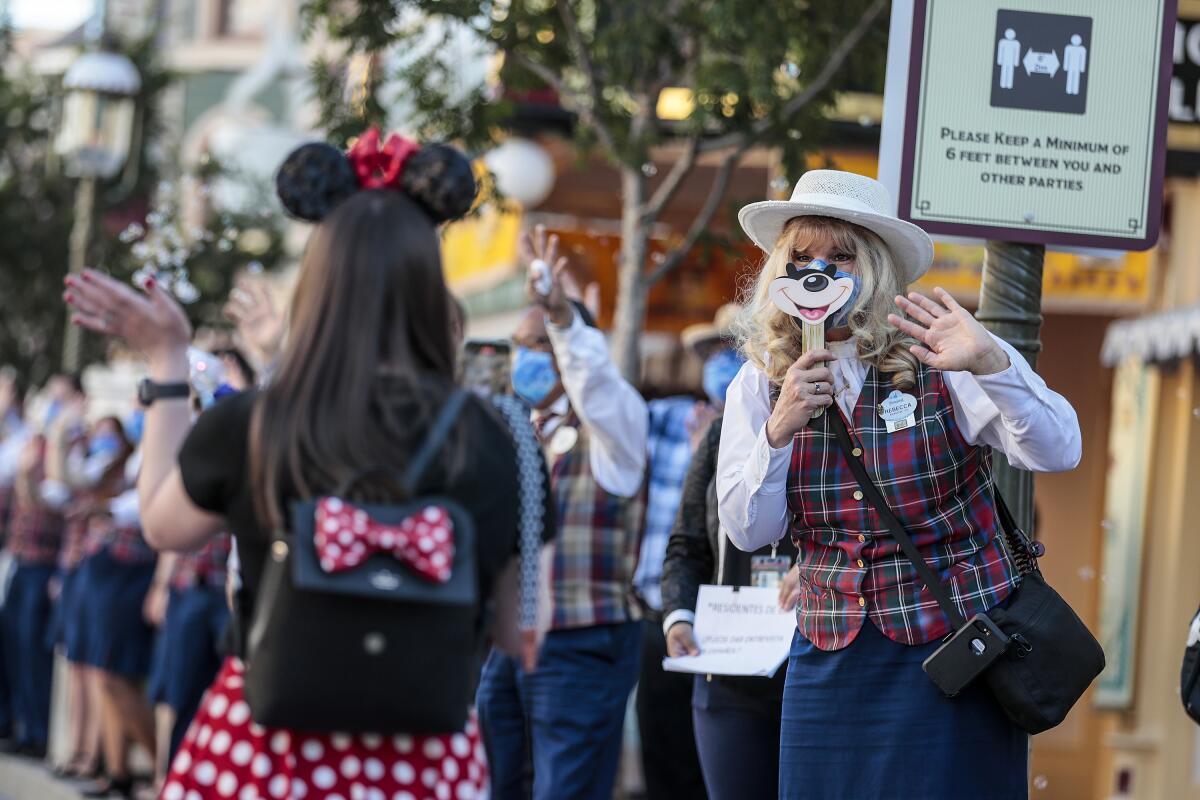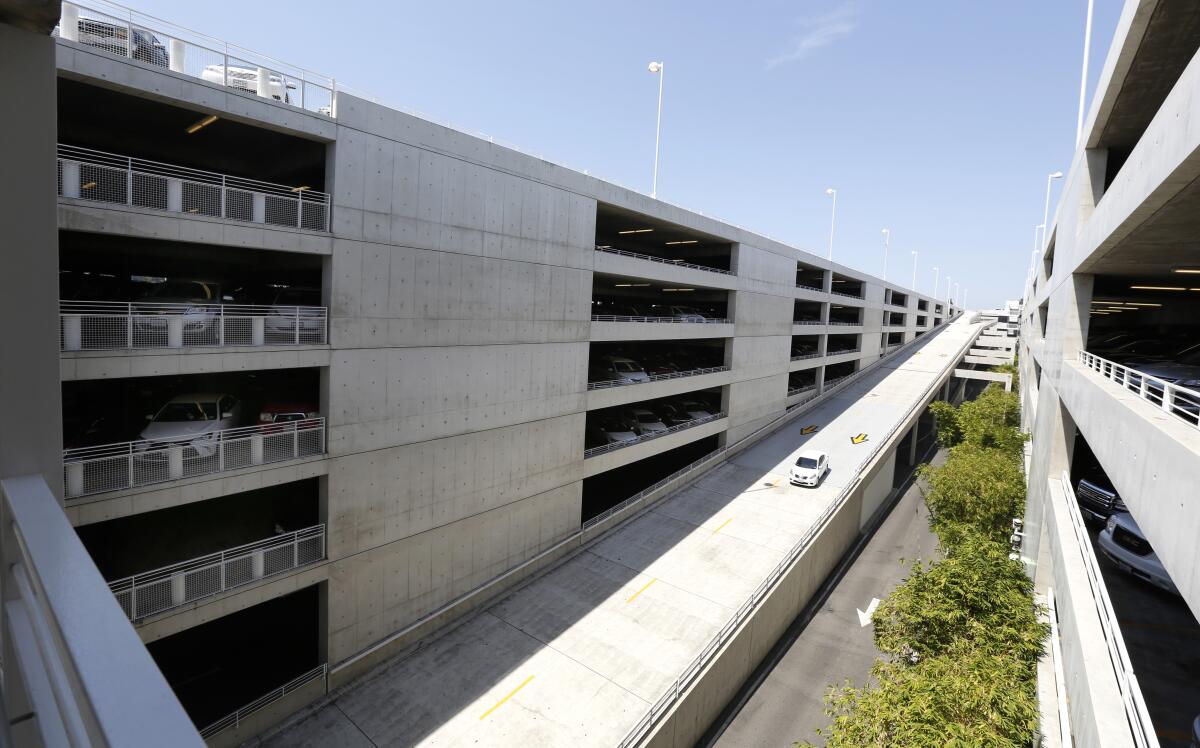Judge rules Anaheim’s living-wage law doesn’t apply to Disneyland

- Share via
A Superior Court judge ruled against Disneyland Resort workers in a class-action lawsuit challenging the company’s exemption from an Anaheim living-wage law.
Passed by voters in 2018, Measure L requires hospitality businesses within the Anaheim Resort area to pay a tiered minimum wage topping at $18 an hour next year if they have tax rebate subsidy agreements with the city.
On Monday, Orange County Superior Court Judge William D. Claster granted a summary judgment in favor of the Disneyland Resort stating that a Disney expansion agreement passed by the city in 1996 didn’t meet the legal definition of a tax rebate subsidy under the living-wage law.
“The court is confronted with a narrow question: whether any of the agreements identified by the parties gives the Disney Defendants a right to a rebate of their taxes,” read Claster’s tentative Oct. 29 ruling. “Whether the city of Anaheim ‘subsidized’ the Disney Defendants in a colloquial sense is not an issue.”
Before going to trial, Claster ruled that the ’96 agreement, in which the city issued $510 million in bonds for resort-area infrastructure improvements in partnership with Disney’s $1.4-billion investment in Disney’s California Adventure, Downtown Disney and Disney’s Grand Californian Hotel, didn’t constitute the tax refund, abatement or discount needed to trigger the living-wage law.
Anaheim continues to pay off bond debt, mostly through sales, property and transient occupancy taxes generated by the Disneyland Resort as part of the ’96 agreement.
“The finance agreement has the apparent effect of giving the Disney Defendants a 100% abatement on debt service payments, not taxes,” read Claster’s tentative ruling. “This is a significant benefit to the Disney Defendants, but again, there is no evidence that the finance agreement somehow lessens their tax obligations.”
Randy Renick, an attorney representing the workers in the class-action suit, criticized the decision.
“We disagree with the court’s narrow reading of Measure L and believe Monday’s ruling eviscerates the 2018 vote to adopt a living wage in Anaheim,” he said. “The plaintiffs are considering all their options, including appeal. It’s disappointing that Disney can take hundreds of millions of dollars from the city of Anaheim and yet refuse to pay over 25,000 workers a living wage.”

Anaheim also financed the construction of the $108-million Mickey and Friends parking structure in the expansion and leases it to Disney for $1 per year, an agreement that attorneys unsuccessfully argued subjects it to the living-wage law.
Two more recent tax rebate agreements didn’t go before Claster; the Disneyland Resort asked Anaheim City Council to shred them in the leadup to Measure L’s victory at the ballot box.
In 2015, Anaheim council members voted to extend a decades-long entertainment tax moratorium for the corporation. Under the policy, if a future council levied an admission tax on parkgoers, Disney would receive a full refund. The following year, a council majority also approved $267 million in transient occupancy tax rebates over 20 years for a planned Disney luxury hotel.
After council members unanimously voted to terminate both agreements at Disney’s request, Anaheim City Atty. Robert Fabela issued a nonbinding legal opinion ahead of the 2018 election that positioned the remaining ’96 Disneyland expansion deal outside the bounds of a “tax rebate” as defined in the living wage law.
“We have always been committed to fair and equitable pay for our cast members but have always agreed with the Anaheim City Attorney’s conclusion that Measure L does not apply to the Disneyland Resort,” said a Disneyland spokesperson in a shared statement. “We are pleased the court has confirmed that position.”
The city also sees Claster’s summary judgment as affirming.
“While we never want to see a dispute like this play out in court, we appreciate the judge’s determination,” said Mike Lyster, Anaheim spokesman. “It validates what we already knew and have said ― the city of Anaheim does not provide any rebate or subsidy to Disney.”
Anaheim’s living-wage law currently applies to a trio of nonunion hotels in its resort area including the Westin, the Anaheim Hotel and J.W. Marriott.
The DoubleTree Suites was the first business in Anaheim subject to the law in 2019, but its transient occupancy tax rebate agreement with the city ended in April, making Measure L no longer applicable.
Support our coverage by becoming a digital subscriber.
More to Read
Inside the business of entertainment
The Wide Shot brings you news, analysis and insights on everything from streaming wars to production — and what it all means for the future.
You may occasionally receive promotional content from the Los Angeles Times.











